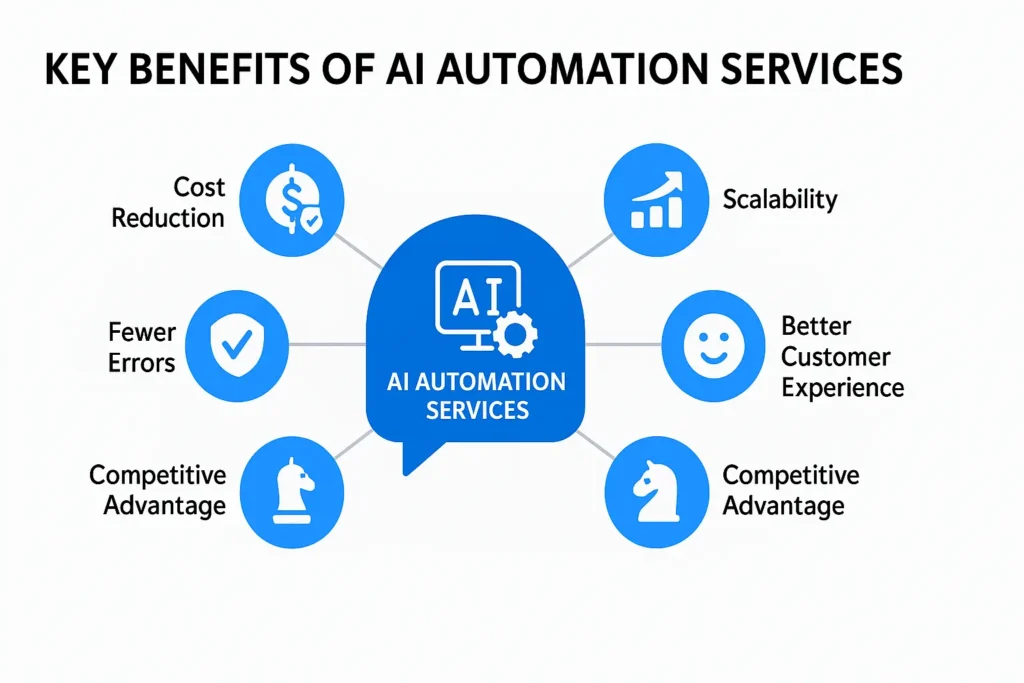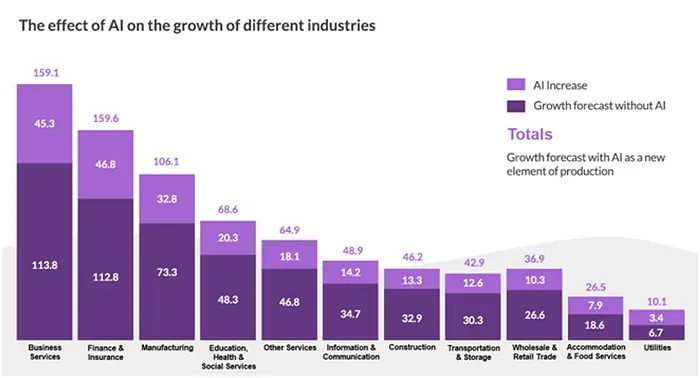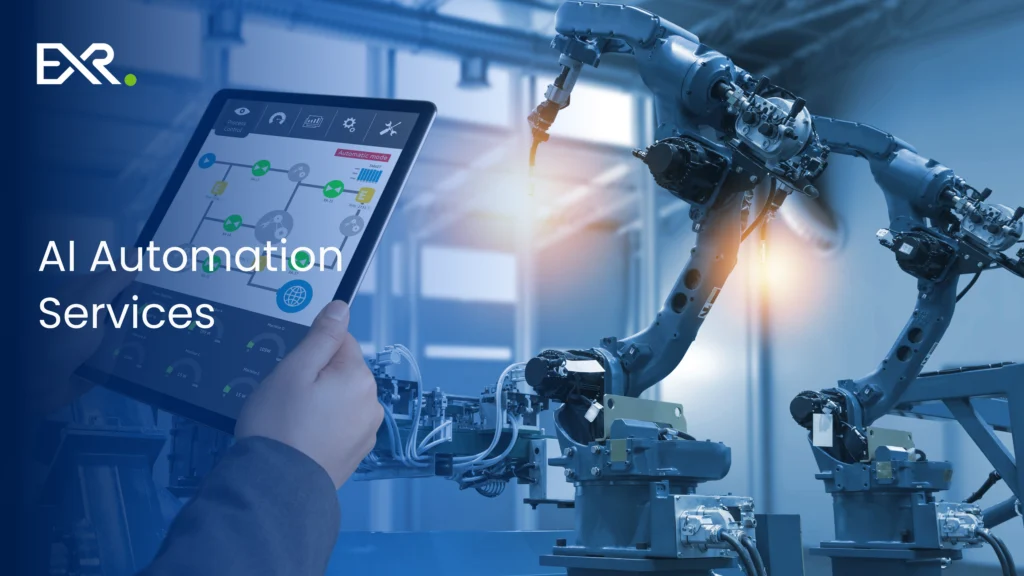Do you know how deeply the new era of AI automation is reshaping today’s most demanding industries? Far from futuristic speculation, the shift is already measurable. A McKinsey study shows 53 % of executives now regularly use generative AI in their workflows, compared to 44 % of mid-level managers, signaling adoption at the top. In real-world applications, the effects are equally striking: customer service teams equipped with AI assistants resolve 15 % more issues per hour, particularly boosting less experienced workers (ArXiv, 2023).
The industrial side tells a similar story. By the end of 2023, the world had over 4.28 million operational industrial robots, a clear marker of automation’s accelerating footprint (Wikipedia). In high-end professional services, the U.S. Bureau of Labor Statistics estimates that 44 % of legal tasks could be automated—forcing even elite law firms to adapt.
These numbers reveal a simple truth: AI automation isn’t optional for luxury, finance, healthcare, or advanced manufacturing—it’s essential. The leaders who embrace it now will not only innovate, but inspire, defining the future of high-end industries in the process.
When I initially saw AI Automation Services in action for the first time, I was shocked.
Retasking our team’s hours of manual work was only to be accomplished in minutes and more accurately.
That is when I noticed: it is not only about time-saving. It is all about changing the manner of operation of the business. In both luxury and manufacturing sectors, such as finance and healthcare, AI automation is silently transforming the entire concept of productivity, innovation, and growth.
What Are AI Automation Services?
AI automation services apply artificial intelligence to complete the tasks that previously demanded human effort. In comparison to simple automation, which operates under predetermined rules, AI automation can also learn, adapt, and make decisions based on the data.
Examples include:
- Personalised customer support chatbots.
- Systems that handle financial documents within minutes.
- Anticipatory tools that project what is needed or will break down.
Concisely, the AI automation services transform ordinary tasks into intelligent, self-enhancing tasks.
The Current State of AI Automation Services in Enterprises
At this point, companies are engaging in high levels of AI automation services. PwC estimates that global spending on AI will be up to $320 billion by 2030. The most prominent areas in terms of adoption are financial services, healthcare, and manufacturing, where speed, accuracy, and scalability are required.
But not every company is at the same stage. Some have problems with integration, high costs, or a lack of skills. This puts a very strong dichotomy: those who adopt early are getting a competitive advantage, and those who adopt late may fall behind.
Key Benefits of AI Automation Services

The greatest benefit of AI automation services is that it changes efficiency and decision-making. Companies in all sectors have been recording quantifiable increases:
- Reduced Costs: McKinsey discovered that automation is able to save operational costs of up to 30%.
- Fewer Mistakes: AI technology enhances precision in compliance, data input, and medical interpretation.
- Scalability: The workloads can be expanded without corresponding staffing increments.
- Greater Customer Experience: One-on-one responses and quicker service develop greater loyalty.
- Competitive Edge: The enterprises that embrace AI automation tend to be ahead of the slower competitors.
These services empower AI Business Ideas to achieve more—faster, smarter, and at lower costs—in simple terms.
Implementing AI Automation Services in Your Business
The implementation of AI automation services does not need to be daunting. Initial small testing, and subsequent scaling give the best results.
Actions to take to achieve success:
- Set clear goals. Choose between cost saving, speed, or better customer service.
- Choose the right tools. Find AI solutions matched to your industry.
- Train your team. Instead of being against AI, employees need to know how to work with it.
- Measure with KPIs. Error reduction, speed in the process, and ROI to realize the actual effect.
- Scale strategically. When a pilot project is successful, extend it to other processes.
This will ease the adoption process, and you can be assured of visible returns on investment at the very beginning.
Learn how AI automation can change your business
Schedule a 30-minute Call!
Ensuring Long-Term Success with AI Automation Services
Implementation of the AI automation services is just a start. Businesses should invest in long-term success to reap the benefits. That implies storing models, monitoring ROI, and ensuring data security.
AI Automation Model Maintenance Strategies
AI models are engines; they require periodical maintenance. The performance declines with time unless updated. Maintenance includes:
- Refreshing data sets.
- Reinforcing models.
- Accuracy of testing.
The model that is well-maintained continues to give consistent results over the years.
Before and After Impact of AI Model Maintenance
- Before maintenance: Deteriorating accuracy, incorrect forecasting, and disappointed users.
- After maintenance: Maintenance is stable, results are reliable, and more people will use it.
The contrast is obvious: constant treatment can avert expensive errors and can guarantee efficiency.
Monitoring AI Automation Services with KPIs for ROI
It is equally important to measure success as much as to use AI. ROI is measured by businesses using key performance indicators like:
- Error reduction percentage.
- Time saved per task.
- Cost per automated process.
- Customer satisfaction ratings
Data Security in AI Automation Services
AI automation is frequently used to work with sensitive information (financial records or patient health files). Businesses lose their trust and are exposed to breaches without good security.
Best practices include:
- In compliance with GDPR, HIPAA, and industry regulations.
- Coding information on all levels.
- Conducting regular security audits.
Trust is adoption in AI automation. There is no compromise on data protection.
Hyper-Automation with AI Automation Services
The extension of AI automation services is hyper-automation. Where basic automation can deal with individual tasks, hyper-automation integrates more than one tool in an attempt to automate whole processes, AI, machine learning, and robotic process automation (RPA).
It’s not just about speed. Hyper-automation will allow making smarter decisions, minimize the human factor, and open a new efficiency dimension in industries.
Unlocking the Benefits of AI-Driven Hyper-Automation
Hyper-automation is truly powerful because it can bring systems that used to be siloed together. Key benefits include:
- End-to-end automation: Processing of data to decision-making.
- Mutual understanding: Various departments exchange knowledge in real time.
- Quickly scale: Enterprise can automate hundreds of processes simultaneously.
- Increased ROI: Gartner estimates that in 2025, organizations that embrace hyper-automation will reduce their operating costs by 30 percent.
Briefly, hyper-automation is not merely more automation. It is scale-based automation to change whole Businesses Solutions
Mini Case Study: Hyper-Automation with AI Automation Services
There were delays in the payment of loans by a global bank, which took a maximum of seven days. The bank brought hyper-automation (Combining AI document processing, RPA, and decision-support models) to minimise approvals to 24 hours only.
The results?
- More rapid customer satisfaction.
- Lower operational costs.
- Increased productivity of employees.
This is an example of how hyper-automation, which is driven by AI automation services, can bring about quantifiable, enterprise-wide impact.
Enterprise AI Automation Services and Scalability
Scalability is the real test of AI automation services when it comes to large organizations. Automation of a single workflow is one thing, and a transformation of the whole enterprise is another. Success needs a proper plan, professional consultancy, and systems that expand with the business.
Crafting an AI Automation Transformation Strategy
A technology plan is not a good strategy. It is a business change map. Key elements include:
- Disciplining automation to the company’s objectives.
- First, focus on high-impact processes.
- Assembling cross-functional teams to create adoption.
Technology is wrought with much more effect when it comes behind strategy.
Expert Insights on AI Automation Implementation
Phased rollouts are frequently stressed by industry experts. As an alternative to automating all things simultaneously, businesses will benefit more by:
- Testing pilot projects.
- Collecting user feedback.
- Expanding step by step.
This method reduces risk, increases adoption, and a smoother scale.
Scalability Considerations in Enterprise AI Automation Services
Scalability implies that your artificial intelligence automation services will be able to expand without the need to reinvest regularly. In the case of enterprises, it incorporates:
- Elastic infrastructure on the cloud.
- Generalizable AI components that can be inserted into the current processes.
- Systems to manage data at scale.
Automation cannot be scaled to success unless it is a small win.
Before and After Impact of AI Scalability
- Before scalability: Automation is confined and only applies to a single department, and usually becomes a bottleneck.
- After scalability: Processes move smoothly through the enterprise, efficiency increases, and costs decline.
This pre-and post-shift demonstrates the reason scalability is the true force of business AI success.
Looking for innovation? Hire a qualified AI Engineer to develop, streamline, and future-proof your business systems.
Case Studies and Best Practices in AI Automation Services

AI automation services can only be regarded as valuable in their practical examples. The global industry is using AI to address the most enduring challenges, cut expenses, and enhance performance. These case studies point to the fact that automation is creating quantifiable success.
Financial Services: Intelligent Document Processing with AI Automation
Banks process huge volumes of data daily, including loan applications and compliance forms. Historically, the documents were done manually, and this retarded operations and also created space for error.
Banks can now scan, extract, and analyze data in minutes with intelligent document processing using AI in Finance. As an example, a large bank in Europe shortened the time of issuing mortgages from weeks to a mere 48 hours by automating the process of documenting.
The benefits include:
- Faster compliance checks.
- Less human error in data entry.
- Anomaly recognition is a better method of fraud detection.
Through the use of AI automation services, financial organizations are enhancing efficiency and customer satisfaction.
Healthcare: Clinical Decision Support with AI Automation
Providers of healthcare are always under pressure to diagnose and treat patients promptly with the need of being accurate. Patient information may include lab results, scans, and history, and this can be overwhelming to doctors who may receive a significant amount of this data.
Clinicians are already assisted by AI automation services that analyze this data in real time and provide evidence-based recommendations. As an illustration, AI systems can point to the potential diagnoses or indicate important lab results that require immediate care.
The results are considerable:
- Reduced diagnostic errors.
- Faster treatment decisions.
- The patients in critical cases have better chances of survival.
One of the studies published in Nature Medicine demonstrated that even AI-assisted diagnostics can be more successful than human radiologists in identifying certain conditions, which proves that AI automation is not a simple tool but a life-saving opponent.
Manufacturing: Predictive Maintenance with AI Automation
The manufacturing plants will face an issue of unplanned downtime due to equipment failures. One machine failure can result in a loss of millions of production.
Factories can use Internet of Things sensors to track equipment health by keeping track of IoT-enabled predictive maintenance that uses AI automation services. The AI then uses the data to forecast when a machine is prone to becoming faulty so that teams can maintain it before failure ensues.
A motor vehicle manufacturer has noted that it has saved 25 percent of its maintenance spending and half the downtime through AI predictive maintenance.
The trickle-down effect makes itself felt: streamlined operations, reduced costs, and increased productivity.
Common Best Practices in AI Automation Services
Successful AI automation practices are common across industries:
- Big in small steps. Start with a high-impact process and then go company-wide.
- Make automation business-oriented. Make sure that all AI projects are connected to quantifiable results, such as lower cost or customer satisfaction.
- Assemble cross-functional teams. Engage IT, operational, compliance, and business leaders in balanced adoption.
- Focus on training and change management of employees. Successful automation only works when individuals are willing to embrace it.
- Keep on improving models. AI is not a one-time deal, but will need continuous updates and monitoring of KPI.
With such practices, organizations will be able to transform AI automation services into a long-term business value.
Power up your projects with our team of advanced AI developers, prepared to provide intelligent automation solutions at scale.
Challenges in Adopting AI Automation Services
The advantages of AI automation services are obvious, but there are barriers to adoption. Most businesses have problems with:
Interoperability with existing systems: The outdated IT infrastructure of older systems can more frequently not speak the same language as the newest AI systems, and thus, they have to remain updated at a high cost.
Large initial investment: Although there is a large ROI in the long term, initial expenses of deployment may act as a detrimental factor, particularly in the case of mid-sized companies.
Shortage of talent: As reported by the World Economic Forum, the demand for AI talent is surpassing the supply, which leaves a skill gap within the organization.
Resistance to change: Employees can be concerned about job loss or distrust of automated systems.
These are the real challenges that may exist, but they are not permanent obstacles. Businesses can overcome them with the help of phased rollouts, effective leadership, and clear communication, and tap into the full potential of AI automation.
Future Trends and Opportunities in AI Automation Services
The future of AI automation services does not only lie in the faster workflow, but it is also a remodel of industries. The major trends of the coming decade are:
- Hyper-automation expansion: Gartner estimates that by 2026, more than 70 percent of large organizations will have implemented hyper-automation technologies.
- Solutions industry-specific: Healthcare Industry: AI will be more applicable in healthcare in terms of diagnostic solutions; Finance Industry: Intelligent compliance will be advanced in the financial industry; Production Industry: Predictive maintenance solutions will grow in the manufacturing industry.
- AI ethics and transparency: As the use increases, businesses should demonstrate that their AI is equitable, impartial, and explicable.
- Human + AI partnership: AI will not replace people but rather become a digital colleague that will assist employees in accomplishing their tasks more quickly and error-free.
To progressive companies, these trends are a threat as well as an opportunity: the ones who move early will win; those who move late will make up the game.
The future of work is unlocked, kickstart with AI automation services and outgrow the competition.
Contact Us!
Thought-Provoking Question on the Future of AI Automation
Assuming AI automation services continue in this direction, will the job market in the future be AI-first and human-assisted, or human-first and AI-assisted?
Conclusion
AI automation services are not optional anymore: they are necessary in terms of reducing costs and innovation. Companies that implement them today are already having higher returns on their investment, accelerated workflow, and increased customer trust.
There are indeed challenges in the journey: integration, cost, and cultural resistance. However, these obstacles can be met by the right approach.
The point is that AI automation is not merely a tool but rather a change.
The way that businesses move in the present will determine the future of the industries in the future. The question is, will you be ready to be innovative and inspired by AI automation?


